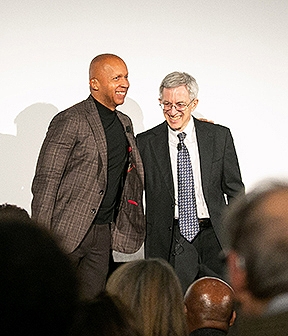At an NYU Law screening of the film based on his work, Bryan Stevenson advocates for criminal justice reform
“When they asked me about making a movie, I was pretty apprehensive, because the books I’ve read that have been turned into movies were not good movies,” said Aronson Family Professor of Criminal Justice Bryan Stevenson, speaking to a large crowd at NYU Law on January 27. “There’s this kind of formulaic way of telling stories, and I was very worried about that.”
Stevenson was discussing the film adaptation of his memoir, Just Mercy: A Story of Justice and Redemption, at a screening that was the first event held in the newly renovated Tishman Auditorium in Vanderbilt Hall. In January 2020, the film Just Mercy opened in movie theaters across the country, following a limited release in December.
What allayed his early concerns about the film project, Stevenson told the audience and his interlocutor, Vice Dean and Professor of Clinical Law Randy Hertz, were conversations with the film’s director, Destin Daniel Cretton, and actor Michael B. Jordan, who expressed their commitment to maintaining his vision.
For just over two hours the audience watched as Jordan portrayed Stevenson working to overturn death row sentences for clients in a racially divided Alabama through the Equal Justice Initiative (EJI), a nonprofit organization that Stevenson founded. The film focuses on the case of Walter McMillian, a man who was convicted and sentenced to death for the murder of a young white woman, despite an abundance of evidence pointing to his innocence.
“Well, it isn’t my job to make people happy. It’s to achieve justice for my client,” Jordan says in the film. He reenacts real-life injustices that Stevenson faced, including a strip search before visiting his client and a frightening traffic stop by police officers who held him at gunpoint.
Stevenson’s efforts resulted in McMillian’s release after six years on death row. The film concludes with photos of the actors’ real-life counterparts and statistics on the death penalty. “For every nine people who have been executed in the US, one person on death row has been exonerated and released, a shocking rate of error,” the epilogue text states.
In answering Hertz’s questions, Stevenson spoke about how EJI’s work has evolved to include noncapital cases and public education, and emphasized the importance of changing societal narratives that reinforce fear and anger toward racial minorities.
“When the general public sees this film, what are the take-home messages that you hope they will bring with them and talk to other people about regarding the criminal justice system, race, capital punishment, all those things?” asked Hertz.
“Number one is that our system is not reliable and that we have to reform it, that there is this problem of unfairness,” Stevenson responded. “There are thousands of innocent people in our jails and prisons right now…and part of the reason why we have to tell these kinds of stories is you have to make people feel some anguish about the plight of these people who have been wrongly convicted.”
Posted February 19, 2020


